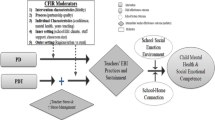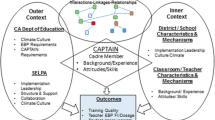Abstract
Children in Sub-Saharan Africa (SSA) are burdened by significant unmet mental health needs. Despite the successes of numerous school-based interventions for promoting child mental health, most evidence-based interventions (EBIs) are not available in SSA. This study investigated the implementation quality and effectiveness of one component of an EBI from a developed country (USA) in a SSA country (Uganda). The EBI component, Professional Development, was provided by trained Ugandan mental health professionals to Ugandan primary school teachers. It included large-group experiential training and small-group coaching to introduce and support a range of evidence-based practices (EBPs) to create nurturing and predictable classroom experiences. The study was guided by the Consolidated Framework for Implementation Research, the Teacher Training Implementation Model, and the RE-AIM evaluation framework. Effectiveness outcomes were studied using a cluster randomized design, in which 10 schools were randomized to intervention and wait-list control conditions. A total of 79 early childhood teachers participated. Teacher knowledge and the use of EBPs were assessed at baseline and immediately post-intervention (4–5 months later). A sample of 154 parents was randomly selected to report on child behavior at baseline and post-intervention. Linear mixed effect modeling was applied to examine effectiveness outcomes. Findings support the feasibility of training Ugandan mental health professionals to provide Professional Development for Ugandan teachers. Professional Development was delivered with high levels of fidelity and resulted in improved teacher EBP knowledge and the use of EBPs in the classroom, and child social competence.


Similar content being viewed by others
References
Aarons, G. A., Cafri, G., Lugo, L., & Sawitzky, A. (2012). Expanding the domains of attitudes towards evidence-based practice: The evidence based practice attitude scale-50. Administration and Policy in Mental Health, 39, 331–340. doi:10.1007/s10488-010-0302-3.
Alegria, M., Vila, D., Woo, M., Canino, G., Takeuchi, D., Vera, M., et al. (2004). Cultural relevance and equivalence in the NLAAS instrument: Integrating etic and emic in the development of cross-cultural measures for a psychiatric epidemiology and services study of Latinos. International Journal of Methods in Psychiatric Research, 13, 270–288.
Ballard, T., Coates, J., Swindale, A., & Deitchler, M. (2011). Household Hunger Scale: Indicator definition and measurement guide. FANTA III Food and Nutrition Technical Assistance, http://www.fantaproject.org/downloads/pdfs/HHS_Indicator_Guide_Aug2011.pdf. Accessed June 2013.
Baumann, A. A., Powell, B. J., Kohl, P. L., Tabak, R. G., Penalba, V., Proctor, E. K., et al. (2015). Cultural adaptation and implementation of evidence-based parent-training: A systematic review and critique of guiding evidence. Children and Youth Services Review, 53, 113–120.
Belfer, M. L. (2008). Child and adolescent mental disorders: The magnitude of the problem across the globe. Journal of Child Psychology and Psychiatry, 49, 226–236.
Bradley, R. H., & Corwyn, R. F. (2005). Caring for children around the world: A view from HOME. International Journal of Behavioral Development, 29, 468–478.
Brotman, L. M., Kingston, S., Bat-Chava, Y., Caldwell, B. M., & Calzada, E. (2008). Training school personnel to facilitate a family intervention to prevent conduct problems. Early Education & Development, 19, 622–642.
Brotman, L. M., Calzada, E., Huang, K.-Y., Kingston, S., Dawson-McClure, S., Kamboukos, D., et al. (2011). Promoting effective parenting practices and preventing conduct problems among ethnic minority families from low-income, urban communities. Child Development, 82, 258–276.
Brotman, L. M., Dawson-McClure, S., Huang, K.-Y., Theise, R., Kamboukos, D., Wang, J., & Petkova, E. (2012). Early childhood family intervention and long-term obesity prevention among high risk minority youth. Pediatrics, 129, 1–8.
Brotman, L. M., Dawson-McClure, S., Kamboukos, D., Huang, K.-Y., Calzada, E., Goldfeld, K., & Petkova, E. (2016). Effects of ParentCorps in pre-kindergarten on child mental health and academic performance: Follow-up of a randomized clinical trial through 8 years of age. JAMA Pediatrics, 170, 1–7.
Carlson, J. S., Tiret, H. B., Bender, S. L., & Benson, L. (2014). The influence of group training in the incredible years teacher classroom management program on preschool teachers’ classroom management strategies. Journal of Applied School Psychology, 27, 134–154.
Child, J. C., Naker, D., Horton, J., Walakira, E. J., & Devries, K. M. (2014). Responding to abuse: Children’s experiences of child protection in a central district, Uganda. Child Abuse & Neglect, 38, 1647–1658.
Conduct Problem Prevention Research Group (CPPRG). (1995). Psychometric properties of the social competence scale—Teacher and parent ratings (fast track project technical report). University Park: Pennsylvania State University.
Damschroder, L. J., & Lowery, J. C. (2013). Evaluation of a large-scale weight management program using the consolidated framework for implemenation research (CFIR). Implementation Science, 8, 2–17.
Dawson-McClure, S., Calzada, E., Huang, K.-Y., Kamboukos, D., Rhule, D., Kolawole, O., et al. (2014). A population-level approach to promoting healthy child development and school success in low-income, urban neighborhoods: Impact on parenting and child conduct problems. Prevention Science, 16, 279–290. doi:10.1007/s11121-014-0473-3.
Devries, K., Child, J. C., Allen, E., Walakira, E. J., Parkes, J., & Naker, D. (2014). School violence, mental health and educational performance in Ugandan primary school children: A cross-sectional survey. Pediatrics, 133, e129–e137.
Diggle, P. J., Heagerty, P., Liang, K.-Y., & Zeger, S. L. (2005). Analysis of longitudinal data. New York: Oxford University Press.
Gardner, W., Murphy, J. M., Childs, G., Kelleher, K., Pagano, M. E., Jellinek, M. S., et al. (1999). The PSC-17: A brief pediatric symptom checklist including psychosocial problem subscales. A report from PROS ad ASPN. Ambulatoory Child Health, 5, 225–236.
Gardner, F., Montgomery, P., & Knerr, W. (2015). Transporting evidence-based parenting programs for child problem behavior (age 3–10) between countries: Systematic review and meta-analysis. Journal of Clinical Child & Adolescent Psychology, 18, 1–14.
Glasgow, R. E., Vogt, T. M., & Boles, S. M. (1999). Evaluating the public health impact of health promotion interventions: The RE-AIM framework. American Journal of Public Health, 89, 1322–1327.
Harter, S. (1982). The perceived competence scale for children. Child Development, 53, 87–97.
Huang, K.-Y., Cheng, S., & Theise, R. (2013). School contexts as social determinants of health: Current practices and impliactions for future public health practice. Public Health Reports, 128, 21–28.
Huang, K.-Y., Nakigudde, J., Calzada, E., Boivin, M., Ogedegbe, G., & Brotman, L. M. (2014). Implementing an early childhood school-based mental health promotion intervention in low-resource Ugandan schools: Study protocol for a cluster randomiozed controlled trial. Trials, 15, 471.
Huang, K.-Y., Abura, G., Theise, R., & Nakigudde, J. (2017). Parental depression and associations with parenting and children’s physical and mental health in Sub-Saharan African settings. Child Psychiatry and Human Development, 48, 517-527. doi:10.1007/s10578-016-0679-7.
Justin, K., & Dunning, D. (1999). Unskilled and unaware of it: How difficulties in recognizing one’s own incompetence lead to inflated self-assessments. Journal of Personality and Social Psychology, 77, 1121.
Kinsman, J., Nakiyingi, J., Kamali, A., Carpenter, L., Quigley, M., Pool, R., & Whitworth, J. (2001). Evaluation of a comprehensive school-based AIDS education programme in rural Masaka, Uganda. Health Education Research, 16(1), 8–100.
Koziol, J., Stephen, M., & Burns, P. (1986). Teachers’ accuracy in self-reporting about instructional practices using a focused self-report inventory. The Journal of Educational Research, 79, 205–209.
Lawire, M. (2009). Parenting around the world: Plus ca change. Journal of Family Studies. Special Issue: Parenting around the world, 15(3), 204–206.
Learning, T. N. C. O. Q. T. A. (2013). Improving teacher–child interactions: Using the CLASS™ in head start preschool programs. https://eclkc.ohs.acf.hhs.gov/hslc/tta-system/teaching/docs/using-the-class.pdf.
Little, R., & Rubin, D. (2002). Statistical analysis with missing data. New Jersey: John Wiley and Sons, Inc..
Nakigudde, J., Bauta, B., Wolf, S., & Huang, K.-Y. (2016). Screening child social emotional and behavioral functioning in low-income country contexts. Jacobs Journal of Psychiatry and Behavioral Science, 2, 016.
Newfield, J. (1980). Accuracy of teacher reports: Reports and observations of specific classroom behaviors. The Journal of Educational Research, 74, 78–82.
Raver, C. C., Jones, S. M., Li-Grining, C. P., Metzger, M., Champion, K. M., & Sardin, L. (2008). Improving preschool classroom processes: Preliminary findings from a randomized trial implemented in head start settings. Early Childhood Research Quarterly, 23, 10–26.
Reinke, W. M., Herman, K. C., Stormont, M., Newcomer, L., & David, K. (2013). Illustrating the multiple facets and levels of fidelity of implementation to a teacher classroom management intervention. Administration and Policy in Mental Health, 40, 494–506. doi:10.1007/s10488-013-0496-2.
SAS Institute Inc. (2011). Base SAS ® 9.3 Procedures Guide. Cary: Copyright © 2011, SAS Institute Inc.
Seidman, E., Raza, M., & Kim, S. (2014). Teacher instructional practices and processes system (TIPPS). New York: New York University.
Sherman, J., & Muehlhoff, E. (2007). Developing a nutrition and health education program for primary schools in Zambia. Journal of Nutrition Education and Behavior, 39, 335–342.
Simpson, D., Glynn, P., Joe, G., & Lehman, W. (2002). Organizational readiness for change. http://ibr.tcu.edu/forms/organizational-staff-assessments/.
Ssebunnya, J., Kigozi, F., & Ndyanabangi, S. (2012). Developing a national mental health policy: A case study from Uganda. PLoS Medicine, 9, e1001319.
The World Bank. (2016). United Nations Educational, Scientific, and Cultural Organization (UNESCO). Institute for Statistics, http://data.worldbank.org/indicator/SE.PRM.CMPT.ZS?locations=UG. Accessed 5 Jan 2017.
Ugandan Ministry of Education and Sports. (2014). Teacher issues in Uganda: A shared vision for an effective teachers policy. http://unesdoc.unesco.org/images/0022/002297/229777e.pdf. Accessed 5 Jan 2016, 2017.
Vicki, K., Manno, M., & Côté, P. (2004). Loss to follow-up in cohort studies: How much is too much? European Journal of Epidemiology, 19, 751–760.
Webster-Stratton, C., Reid, M. J., & Hammond, M. (2001). Preventing conduct problems, promoting social competence: A parent and teacher training partnership in head start. Journal of Clinical Child Psychology, 30, 283–302.
WHO. (2005). Atlas: Child and adolescent mental health resources: Global concerns, implications for the future. Geneva: World Health Organization.
WHO. (2007). Task shifting to tackle health worker shortages. http://www.who.int/healthsystems/task_shifting_booklet.pdf.
WHO. (2011). Countries Statistics. http://www.who.int/countries/en/. Accessed Apr 2014.
Author information
Authors and Affiliations
Corresponding author
Ethics declarations
Funding
This study was funded by the National Institutes of Health (R21MH097115-01A1).
Conflict of Interest
The authors declare that they have no competing interests.
Ethical Approval
The ethics related to this study was approved by the Institutional Review Boards of New York University School of Medicine (IRB No. S13-00362), Makerere University (IRB No. SBS110), and Ugandan National Science and Technology (IRB Nos. SS3194 and SBS132).
Informed Consent
The study involved human participants. All participants, including mental health professionals, school principals, teachers, and parents, were consented prior to the study.
Rights and permissions
About this article
Cite this article
Huang, KY., Nakigudde, J., Rhule, D. et al. Transportability of an Evidence-Based Early Childhood Intervention in a Low-Income African Country: Results of a Cluster Randomized Controlled Study. Prev Sci 18, 964–975 (2017). https://doi.org/10.1007/s11121-017-0822-0
Published:
Issue Date:
DOI: https://doi.org/10.1007/s11121-017-0822-0




